For Italian version please scroll down
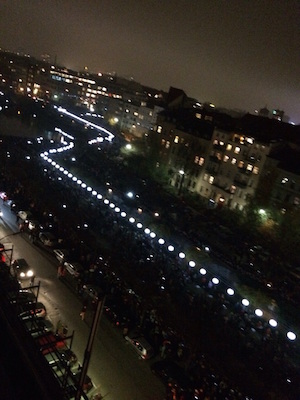
Die Nacht in Berlin
For some people, the night is like the Siren’s song for Ulysses. A call which is impossible to resist, a spell that is repeated every day, which bends one’s will and dulls reason, making it a distant and weak cry of our own consciousness, a voice which is destined to be ignored.
That’s how it’s been ever since we were little. There are children who, just after sunset, sleep contently. Then there are those who hear voices and noises, those who imagine shadows taking shape and that, from hearing a footstep in the distance, gasp with a mix of fear and excitement. Even as a grown up, there are those who fall asleep without any problem and those who, after turning off the bedside light, fantasize about their future or retrace things that have already been lived, imagining a different ending every time. There are those who twist and turn in their beds, struggling with thoughts and concerns and who find themselves face to face with their own ghosts that they insist in not facing. Everyone waits for the new day to bring an apparent calm to their heads, to their hearts, to their lives.
The night is mysterious; it is dark, unpredictable
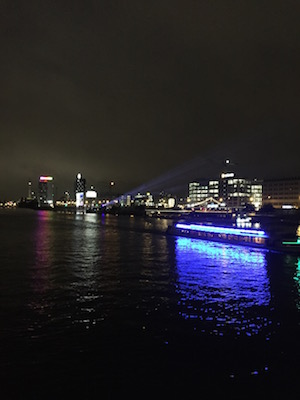
Die Nacht in Berlin
How many things are hidden in the shadow of the moon, and how many feelings are awakened during the hours before morning light? The night serves as an emotional amplifier. Everything becomes huge in our minds, taking on forms, which are deformed beyond belief. Our imagination makes things possible, which, at the first light of the Sun, dissolve into darkness. Many instincts take over, annihilating our will and clouding our judgment, which becomes less and less vigilant as the darkness advances. It is for this reason that at night you can do things that the next day you would like to forget. We come into contact with the dark and hidden part of ourselves, with unmentionable desires, with fears that we do not confront when lucid, with a loneliness, which is difficult to fill.
It is at night that you meet the unwanted, the lunatics, the vagrants and the drunks. But the night is also a time for lovers, poets and stars.
For those who are looking for a palliative or an escape from their illness or own thoughts, for those who cannot sleep, or for those who simply want to live and enjoy life after dusk, Berlin offers endless possibilities for entertainment that meet everyone’s needs.
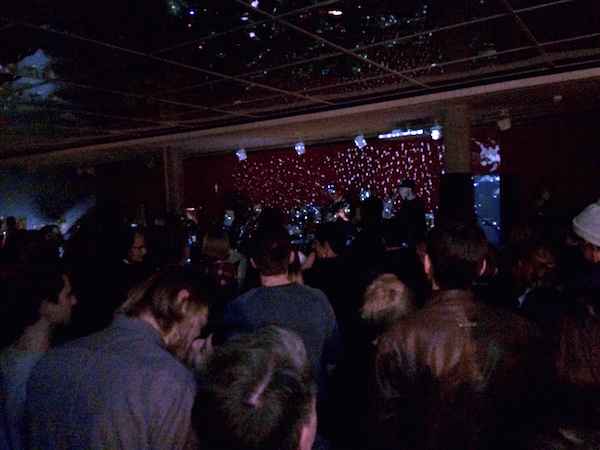
Die Nacht in Berlin
Here the night is always young. In addition to all the cultural events that often go on until very late, there are late-night bars, clubs and discos for people of every age and every taste. The greatest attraction is techno music, which attracts more tourists to the city than the museums. Those who love techno come to Berlin for Berghain, the temple of music known throughout the world, for Tresor, an institution of more than 25 years old, for About Blank with its outdoor garden, for Renate, located in an ancient building once occupied by squatters on Treptower Bridge, for the picturesque Watergate overlooking the Spree, for Weekend with its terrace in front of the TV tower, or for the festivals and parades that are organized every year. Drugs, sex, alcohol and loud music are the ingredients, which are common across all of the weekend festivities. But even though each of these clubs organizes sensational evenings, Berghain is something else – it’s been hailed as the best club in the world by the British DJ Magazine – it’s a mecca for electronic music fans.
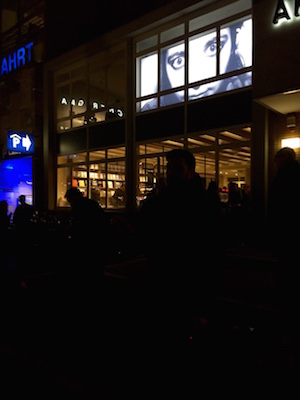
Die Nacht in Berlin
It’s not easy to enter
I remember in detail the first time I went there. It was the summer of 2010. I was with some German friends who I had only recently met. We arrived in front of the club. I stood with mouth wide open at all the people who were still queueing at 4 am. There were thousands of people between 20 and 50 years old who were trying to keep themselves warm, crossing thin arms, rubbing hands or hopping from one leg to another. I had never seen anything like it, not even at a stadium or at a concert.
After a quick greeting to the bouncer, we entered without paying and without even waiting for one minute. Being allowed to enter, as I later found out, is not easy, but for those who endure the mile-long queue and have the good fortune to cross the entrance, undergoing full body searches (they also cover the lenses on mobile phones to prevent photos from being taken inside the premises), the show which is on display is unique, impossible to describe. In addition to the impressive structure, a former power station on the border between Kreuzberg and Friedrichshain, where the club gets its name from (obtained from the portmanteau of Kreuz-berg and Friedrichs-hain), what is most striking is the range of experiences that you can try out, and the things you can participate in during an entire weekend of non-stop music. Fortunately I was with the right people. My friends knew the bouncers and all the staff who we later met inside, which is how I managed avoiding the risk of not being admitted into the club.Once I was inside the huge entrance hall, I saw people stretched out on concrete benches. Some of them were bent over themselves to recover from drugs, others were lying down to sleep for a couple of hours and to then go back and dance. I do not know whether on that first occasion (as I tried to get my bearings) I was more impressed by the naked people who walked casually into the dark room, or by the work of Piotr Nathan hanging on a 20 metre high wall in front of the cloakroom. Climbing the steel staircase, which leads to the dance floor – I still remember the effort to accustom my eyes to the pitch black darkness and smoke – there was a crowd of people in the center of the room moving in unison in front of the DJ booth, who was for sure some kind of celebrity in the techno music scene. As well as on the dance floor, there were people all over the place. A group of boys were dancing on the stairs at the sides of the dance floor, others were glued to the speakers (which were taller than them) some people were moving in an agile manner on a raised structure in the middle of the room. Two muscular guys were swinging clinging to the chains hanging from the ceiling whilst blue lights were tracing geometric lines on their backs and on their bare chests, shiny with sweat, while thousands of other boys, all around me, were moving their feet and arms in unison like an army of soldiers dancing. I felt a sense of alienation but also the impression of being a spectator to something that I would not forget. I was in a place that was totally different than any other club in London, Paris or Barcelona that I had ever been to. Berghain does not try be charming, it makes no effort to be a cool place. It seemed as though they had opened the doors of the old factory for the event and that people had started dancing regardless of anything else that was going on, unaware of one another. I was the only one who was dressed in a „cute“ way. If I had gone alone, I’m sure they would have not let me in. Despite having earplugs, kindly provided to me by the staff working in the cloakroom, the power of the music, with its vibrations, almost made me wince with every beat. That music managed to get inside of you and get you moving as though it were an absolute necessity. It took you into a state of unconsciousness vigilance.
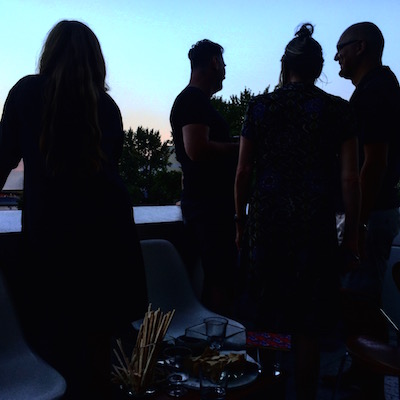
Blaue Stunde
A morning light briefly flooded the room
I was on the dance floor, but at the same time I was in a place inside and outside of myself, surrounded by thousands of other people, like in a collective ritual.
I danced for a long time and for sure lost track of time. I decided to look for my friends, whom I had lost – I have no idea how long for. On the right side, where one of the bars and chill out areas are, I found a couple of them sitting down smoking on a swinging platform. On the left side of the booth, past the bathrooms, where three or four people came out of the doors at a time, there was a great coming and going of people because of the dark room (dark corridors where occasional sexual encounters occur.) On the upper floor, where Panorama Bar is, the atmosphere was different, more relaxed somehow. The music was more house rather than techno. Behind the bar, in the middle of the room, other friends were chatting, or rather, attempting to speak, sat on the sofas. I saw works by Marc Brandenburg and Wolfgang Tillmans, and at the side of the room, there were steel booths open at the front, where people withdrew to to satisfy a variety of needs.
It was now seven o’clock, when for a moment, the shutters opened and they let in the morning light that briefly flooded the room. The effect was amazing. Everyone started to scream with excitement, but after a few seconds, everything was dark and blurry like it had been a few moments before. Everybody wound their heads down to the rhythm of techno in a dense cloud of smoke and sweat.
It was a very long night and even though the music was going on until Monday morning, I decided to leave. After that time, I went back again. I was either invited there by a DJ or by Lorenzo, a friend who works in the cloakroom.
Once I even saw a concert/performance by Carsten Nicolai, also known as Alva Noto, father of electronic music and founder of the record label Raster-Noton, but even so, I remember that first experience it better than any other time.
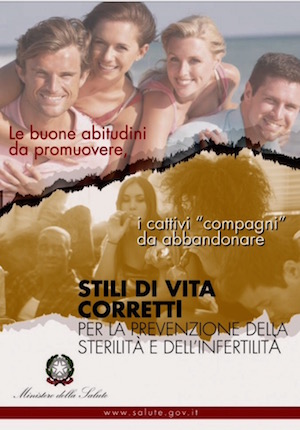
Fertility Plakat aus Italien
The Fertility Day
One of the great cultural differences that I often reflect upon between Protestant Berlin and Catholic Italy is that here, there isn’t a tendency to deny reality, to pretend that certain things do not exist. Why deny that there are people who like to swap partners, practise casual sex, or who get excited about peculiar things or situations? Quite simply, here in Berlin these things not only go uncondemned, but more strikingly people don’t deny the existence of certain instincts or sexual tastes that, on the contrary, are completely natural, even if they are less commonplace. In Italy we organize events such as Family Day, or worse still, Fertility Day. If you want to have children you are advised not to meet up with black guys, or men who smoke hashish. This is later on then denied and the person responsible for the communication is made into a scapegoat and becomes solely responsible for the xenophobic campaign. Meanwhile, here in Berlin whoever becomes a parent receives major financial support from the state, whilst in turn those who want to hang out in a club for three consecutive days, whether they are professional or a student, is free to do so without feeling guilty or paranoid.
I do not think that Berlin is a city without problems. I do not think that people here are better or worse than elsewhere. I am also convinced that some intolerant and racist sentiments are common to all men. However, people are definitely accustomed to respecting the freedom of others without making moral judgments. And even here, there are most likely self-righteous moralists and conservatives, but this does not prevent an absolute sexual freedom. This strikes me as a good thing.
ITALIAN VERSION

Die Nacht in Berlin
Per alcuni la notte è come il canto delle sirene per Ulisse. Un richiamo al quale è impossibile sottrarsi, un incantesimo che si ripete ogni giorno, che piega la volontà e ottenebra la ragione rendendola solo un’eco lontana e debole della nostra coscienza, una voce destinata a essere ignorata.
È così sin da piccoli. Ci sono bambini che, subito dopo il tramonto, dormono beati, e poi ci sono quelli che sentono voci e rumori, che fanno prendere forma alle ombre e che per un passo sentito in lontananza hanno il cuore in gola in un misto di paura e di eccitazione.
Anche da grandi c’è chi si addormenta senza problemi e chi, spenta la luce sul comodino, fantastica sul proprio futuro o ripercorre le cose già vissute immaginando un finale sempre diverso. C’è chi si gira e rigira tra le lenzuola lottando con pensieri e preoccupazioni e chi si ritrova a tu per tu con i propri fantasmi che si ostina a non voler vedere. Tutti aspettando che sia il nuovo giorno a riportare una calma apparente nella propria testa, nel proprio cuore, nella propria esistenza.

Die Nacht in Berlin
La notte è misteriosa, buia, imprevedibile.
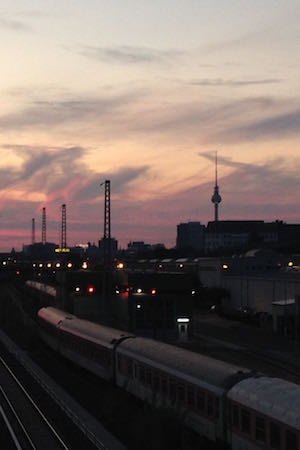
Die Nacht in Berlin
Quante cose si nascondono all’ombra della luna, e quante sensazioni si risvegliano nelle ore che precedono il mattino.
La notte funge da amplificatore emozionale. Tutto s’ingigantisce nella nostra mente assumendo contorni che si deformano fino all’inverosimile. La nostra fantasia rende possibili cose che, alla prima luce del sole, si dissolvono come le tenebre.
Tante pulsioni prendono il sopravvento annichilendo la nostra volontà e offuscando il nostro buon senso, sempre meno vigile man mano che il buio avanza. È per questa ragione che di notte si possono fare cose che il giorno dopo si vorrebbero dimenticare. Si entra in contatto con la parte di noi più buia e nascosta, con i desideri inconfessabili, con le paure che non si affrontano da lucidi, con una solitudine difficile da colmare.

Die Nacht in Berlin
È di notte che si incontrano gli indesiderati, i matti, i vagabondi e gli ubriaconi. Ma la notte è anche il momento degli amanti, dei poeti e delle stelle.
Per chi cerca un palliativo o una via di fuga dal proprio malessere o dai propri pensieri, per chi non riesce a dormire, o per chi vuole semplicemente vivere e godersi la vita anche dopo il crepuscolo, Berlino offre infinite possibilità d’intrattenimento che corrispondono alle esigenze più disparate.
Qui la notte è sempre giovane. Oltre a tutti gli eventi culturali che spesso si protraggono fino a molto tardi, ci sono night bar, locali e discoteche per gente di ogni età e per ogni gusto.
La maggior attrattiva è la techno music che porta più turisti di quanto non ne portino i musei. Chi ama la techno viene a Berlino per il Berghain, il tempio della musica conosciuto in tutto il mondo, per il Tresor, oramai un’istituzione da più di 25 anni, per l’About Blank con il suo giardino all’aperto, per il Renate, che si trova in un vecchio edificio un tempo occupato da squatters proprio sul ponte di Treptower, per il suggestivo Watergate affacciato sulla Sprea, per il Weekend con la terrazza di fronte alla torre della TV, oppure per i festival e le parade che si organizzano ogni anno.
Droga, sesso, alcol e musica assordante sono l’ingrediente che accomuna tutte le feste del fine settimana. Ma se ognuno di questi locali organizza serate sensazionali, tra tutti è il Berghain – considerato il miglior club del mondo dalla rivista inglese DJ Magazine – la mecca per gli amanti dell’elettronica.
Non è facile entrare
Ricordo con esattezza la prima volta che ci andai. Era l’estate del 2010, ero con alcuni amici tedeschi da poco conosciuti. Arrivato davanti al locale, rimasi a bocca aperta per tutta la gente che era ancora in coda alle 4 di mattina. C’erano migliaia di persone tra i 20 e i 50 anni che cercavano di mantenersi calde incrociando strette le braccia, strofinandosi le mani o saltellando da una gamba all’altra. Non avevo mai visto niente di simile, neanche allo stadio o a un concerto.
Dopo un rapido saluto ai buttafuori, entrammo senza pagare e senza dover aspettare neanche un minuto.
Entrare, come ho imparato in seguito, non è impresa facile, ma per chi resiste alla fila chilometrica e ha la fortuna di varcare l’ingresso, sottoponendosi a tanto di perquisizioni corporali (vengono coperti anche gli obbiettivi dei telefonini per impedire che siano scattate foto all’interno del locale), lo spettacolo che si presenta è unico, impossibile da descrivere. Oltre all’impressionante struttura, un’ex centrale elettrica al confine tra Kreuzberg e Friedrichshain, alla cui posizione si deve il nome del locale (ottenuto dalla crasi di Kreuz-berg e Friedrichs-hain), ciò che più colpisce è la gamma di esperienze che si possono provare e ciò a cui si può assistere durante l’intero fine settimana di musica no stop.
Fortunatamente ero con le persone giuste. I miei amici conoscevano dal buttafuori a tutto il personale che abbiamo poi incontrato all’interno, per cui non corsi il rischio di non essere ammesso al club.
Appena dentro la gigantesca sala d’ingresso, vidi persone distese su panchine di cemento. Alcune erano piegate su sé stesse per riprendersi dalle droghe, altre sdraiate per dormire un paio d’ore e poi tornare a ballare.
Non so se quella prima volta, mentre cercavo di orientarmi, ero più colpito dalla gente nuda che camminava con disinvoltura verso le dark room, o dall’opera di Piotr Nathan appesa su una parete di circa 20 metri di fronte al guardaroba. Salita la scala d’acciaio che porta al dance floor – ricordo ancora lo sforzo di abituare gli occhi al buio pesto e al fumo – ecco al centro della sala una folla di persone muoversi all’unisono davanti alla console del dj, di sicuro una celebrità nel panorama della techno music. Oltre che in pista, c’erano persone ovunque. Un gruppetto di ragazzi ballava sulle scale poste ai lati del dance floor, altri erano incollati alle casse alte più di loro, alcuni si muovevano agili su una struttura rialzata al centro della sala. Due ragazzi muscolosi si dondolavano aggrappati alle catene che scendono dal soffitto mentre le luci azzurre tracciavano linee geometriche sulle loro schiene e sui loro petti nudi, lucidi di sudore, mentre migliaia di altri ragazzi, tutti intorno a me, muovevano piedi e braccia all’unisono, come un esercito di soldati danzanti. Avvertivo un senso di straniamento ma anche l’impressione di essere spettatore di qualcosa che non avrei dimenticato. Ero in un luogo assolutamente diverso da qualsiasi altra discoteca di Londra, Parigi o Barcellona in cui fossi mai stato. Al Berghain non c’era niente di accattivante, nessuno sforzo di essere un locale cool. Dava quasi l’impressione che avessero aperto le porte di quella vecchia fabbrica per caso e che la gente avesse cominciato a ballare senza badare a nient’altro, senza accorgersi gli uni degli altri. Ero forse l’unico che era vestito “carino”. Fossi andato solo, non mi avrebbero fatto di sicuro entrare.
Nonostante i tappi alle orecchie, forniti gentilmente dal personale che lavora al guardaroba, la potenza della musica, con le sue vibrazioni, quasi riusciva a farmi sobbalzare a ogni battito. Quella musica era in grado di entrarti dentro e di farti muovere come per una necessità assoluta. Ti portava in uno stato di vigile incoscienza. Ero sul dance floor ma contemporaneamente ero in un posto dentro e fuori di me insieme, circondato da migliaia di altre persone, come in un rito collettivo.

Blaue Stunde
La luce del mattino che per pochi istanti inondò la sala

Fertility Plakat aus Italien
Ballai a lungo, di sicuro persi la cognizione del tempo. Decisi di cercare i miei amici, persi non so più da quanto.
A destra, dove c’è uno dei bar e la zona chill out, trovai un paio di loro seduti a fumare su una piattaforma altalenante. A sinistra della consolle, superati i bagni dalle cui porte uscivano tre o quattro persone alla volta, c’era un grande via vai a causa delle dark room, corridoi bui in cui avvengono accoppiamenti occasionali. Al piano superiore, dove c’è il Panorama Bar, l’atmosfera era diversa, in un certo senso più rilassata. La musica era più house che techno. Dietro al bar, al centro della sala, altri amici parlavano, o meglio, tentavano di parlare, seduti sui divani. Vidi le opere di Marc Brandeburgo e Wolfgang Tillmans e, al lato della sala, delle cabine d’acciaio aperte sul davanti, dove la gente si apparta per soddisfare i bisogni più svariati.
Erano ormai le sette quando per un attimo, aperti gli scuri, fecero entrare la luce del mattino che per pochi istanti inondò la sala. L’effetto fu incredibile, tutti iniziarono a urlare per l’eccitazione, ma dopo pochi secondi, tutto tornò buio e sfocato come pochi istanti prima, ognuno a far ciondolare la testa al ritmo della techno in una fitta nube di fumo e sudore.
Fu una nottata molto lunga, ma sebbene la musica non sarebbe terminata prima del lunedì, decisi di andare via.
Dopo quella volta, ci sono tornato ancora, sempre invitato da qualche dj o da Lorenzo, un amico che lavora al guardaroba.
Una volta ho persino visto il concerto/performance di Carsten Nicolai, conosciuto anche come Alva Noto, padre dell’elettronica e fondatore dell’etichetta discografica Raster-Noton, ma nonostante ciò, quella prima esperienza la ricordo sempre meglio di qualsiasi ultima volta.
Il Fertility Day
Una delle grandi differenze culturali che riscontro spesso tra la protestante Berlino e la cattolica Italia, è che qui non si tende a negare la realtà, a far finta che certe cose non esistano.
Perché negare che ci siano persone cui piace fare scambi di coppie, praticare del sesso occasionale, o che si eccitano per cose o situazioni particolari? Molto semplicemente qui a Berlino non solo non si condanna, ma tanto meno si nega l’esistenza di alcune pulsioni o gusti sessuali che, al contrario, sono altrettanto naturali anche se meno comuni.
In Italia si organizzano eventi come il family day o, peggio, il fertility day. E mentre il Ministero della Salute promuove una campagna a favore dell’aumento demografico consigliando di non frequentare ragazzi di colore, o che fumano hashish, salvo poi ritrattare tutto e trovare un capro espiatorio nell’addetto alla comunicazione, unico responsabile della xenofoba campagna pubblicitaria, qui a Berlino chi diventa genitore riceve grandi aiuti economici dallo Stato, così come chi vuole chiudersi in un club per tre giorni di seguito, che sia un professionista o uno studente, è libero di farlo senza sensi di colpa né paranoie.
Non credo che Berlino sia una città senza problemi, non credo che qui la gente sia migliore o peggiore di altre, sono anche convinto che alcuni sentimenti d’intolleranza e razzismo siano comuni a tutti gli uomini, ma di sicuro la gente è abituata a rispettare l’altrui libertà senza esprimere giudizi morali. E se anche qui, com’è probabile che sia, esistono conservatori moralisti e benpensanti, ciò non impedisce che ci sia una libertà sessuale assoluta. Il che mi sembra un bene.
